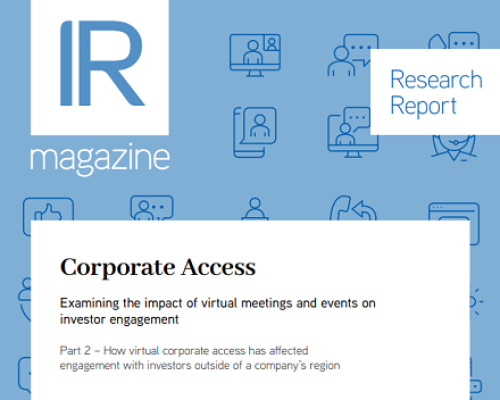Most European investors have stopped attending conferences but a significant number remain open to meetings despite the rapid spread of coronavirus, according to research by Phoenix-IR, a corporate access firm.
The survey, which polled the views of European institutional investors between March 11 and March 12, finds that 76 percent of respondents say they are no longer attending investment conferences.
But while Europe is now considered the epicenter of the coronavirus pandemic and countries are imposing strict controls on movement and social contact, the majority of respondents are still conducting in-person meetings with companies.
Of the investors polled, 60 percent say they are still hosting one-on-ones in their offices, while around half (49 percent) are attending company group breakfasts and lunch meetings.
The survey heard from 80 investors based in Europe, who collectively manage around $2.5 tn in assets under management. The biggest proportion of respondents are based in the UK, followed by Switzerland.
European investment firms have been increasing restrictions on employees as the coronavirus outbreak spreads, although each firm is approaching the situation in its own way. ‘Many of the bigger institutions were the first to suspend face-to-face meetings,’ says Adrian Rusling, founder of Phoenix-IR.
The coronavirus outbreak has forced the postponement or cancellation of many European conferences, while others are converting to virtual-only events. Those affected include Credit Suisse’s 2020 European Banks Conference and Goldman Sachs’ Disruptive Technology Symposium.
The survey also finds 73 percent of respondents are no longer taking part in reverse roadshows and 54 percent have had international travel suspended by their firms.
The number of investors unwilling or unable to travel will have risen again over the weekend following the implementation of new controls on movement across various countries.
In Spain, the government announced a state of emergency and banned people from leaving their homes for two weeks except for essential journeys, such as to buy food or visit hospital. Meanwhile, France announced the closure of non-essential services such as restaurants and cinemas.
Various countries also strengthened border controls. Among the measures, the US said it would extend its ban on visitors from the European Schengen Area to cover the UK and Ireland.
For companies wondering how to remain in contact with their shareholders during the coronavirus outbreak, the research suggests that investors are happy with low-fi forms of technology.
When asked to pick between the telephone and video for talking with companies, 67 percent of respondents selected the phone. This choice is partly down to ‘the perceived technical and logistical barriers to setting up’ video calls, notes the survey.
‘We’ve cancelled six roadshows and are transforming them into ‘virtual’ events – mostly calls but some video,’ says Rusling. ‘Our clients are still communicating; they’re just not traveling for the moment.’
More companies are also exploring the possibility of virtual shareholder meetings as Covid-19 forces the cancellation of in-person AGMs.










